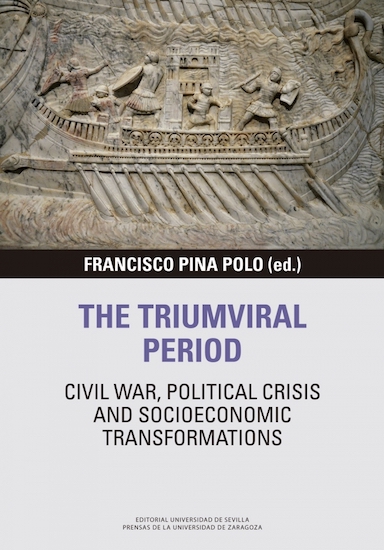Nothing from the subsequent Augustan age can be fully explained without understanding the previous Triumviral period (43-31 BC). In this book, twenty experts from nine different countries and nineteen universities examine the Triumviral age not merely as a phase of transition to the Principate but as a proper period with its own dynamics and issues, which were a consequence of the previous years. The volume aims to address a series of underlying structural problems that emerged in that time, such as the legal nature of power attributed to the Triumvirs; changes and continuity in Republican institutions, both in Rome and the provinces of the Empire; the development of the very concept of civil war; the strategies of political communication and propaganda in order to win over public opinion; economic consequences for Rome and Italy, whether caused by the damage from constant wars or, alternatively, resulting from the proscriptions and confiscations carried out by the Triumvirs; and the transformation of Roman-Italian society. All these studies provide a complete, fresh and innovative picture of a key period that signaled the end of the Roman Republic.
- Cover
- Title page
- Copyright page
- Contents
- Introduction, Francisco Pina Polo
- I. Continuity and change: interactions between triumviral and republican institutions
- The Triumvirate Rei Publicae Constituendae: Political and Constitutional Aspects, Frederik Juliaan Vervaet
- The Functioning of the Republican Institutions under the Triumvirs, Francisco Pina Polo
- Senatorum ... incondita turba (Suet. Aug. 35.1). Was the Senate Composed so as to Ensure its Compliance?, Marie-Claire Ferriès
- II. War and peace
- The Notion of Bellum Civile in the Last Century of the Republic, Valentina Arena
- Civil War and the (Almost) Forgotten Pact of Brundisium, Carsten Hjort Lange
- A Framework of Negotiation and Reconciliation in the Triumviral period, Hannah Cornwell
- Children for the Family, Children for the State: Attitudes towards and the Handling of Offspring during the Triumvirate, Francesca Rohr Vio
- III. Strategies of political communication
- The Intersection of Oratory and Institutional Change, Catherine Steel
- Invectivity in the City of Rome in the Caesarian and Triumviral periods, Martin Jehne
- Fear in the City during the Triumviral Period: The Expression and Exploitation of a Politic Emotion, Frédéric Hurlet
- The Reception of Octavian's Oratory and Public Communication in the Imperial Period, Henriette van der Blom
- Information Exchange and Political Communication in the Triumviral Period: Some Remarks on Means and Methods, Enrique García Riaza
- Marcus Antonius: Words and Images, Kathryn Welch
- IV. Crisis and restoration at rome and in italy
- Consumption, Construction, and Conflagration: The Archaeology of Socio-political Change in the Triumviral Period, Dominik Maschek
- The Socio-political Experience of the Italians during the Triumviral Period, Cristina Rosillo-López
- Hasta infinita? Financial Strategies in the Triumviral Period, Marta García Morcillo
- V. The triumvirs and the provinces
- Provinces and Provincial Command during the Triumvirate: Hispania as a Study Case, Alejandro Díaz Fernández
- Triumviral Documents from the Greek East, Andrea Raggi
- Antonius and Athens, W. Jeffrey Tatum
- VI. Conclusion
- Law, Violence and Trauma in the Triumviral Period, Clifford Ando
- Index of ancient names
- Index of subjects

